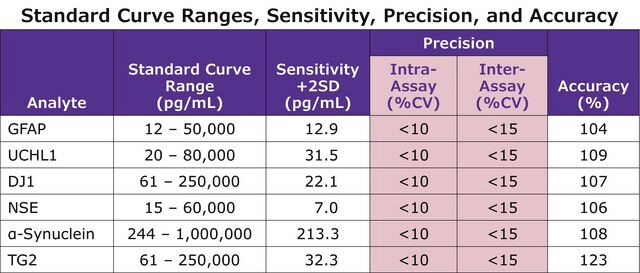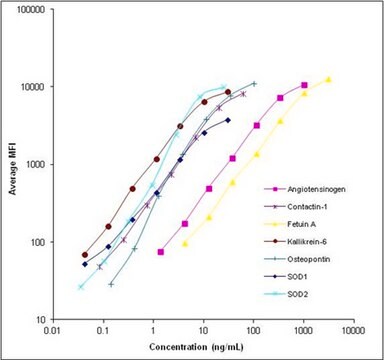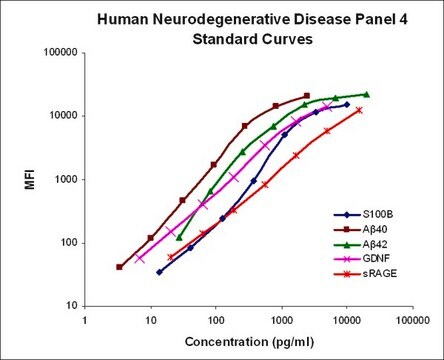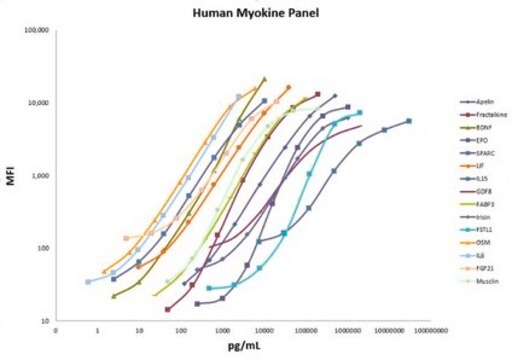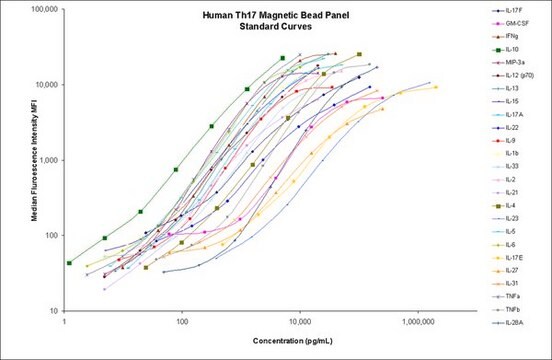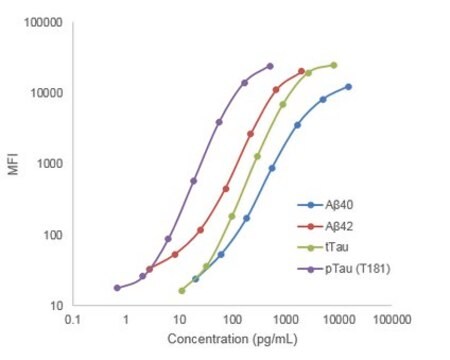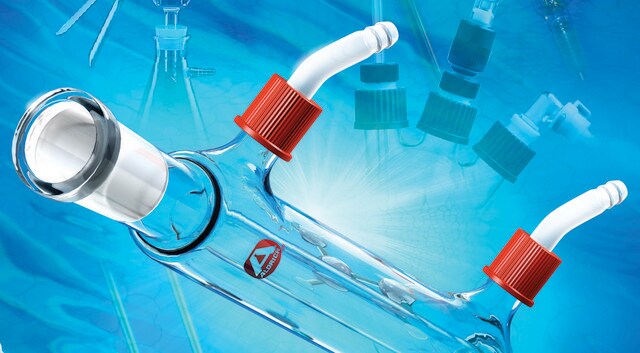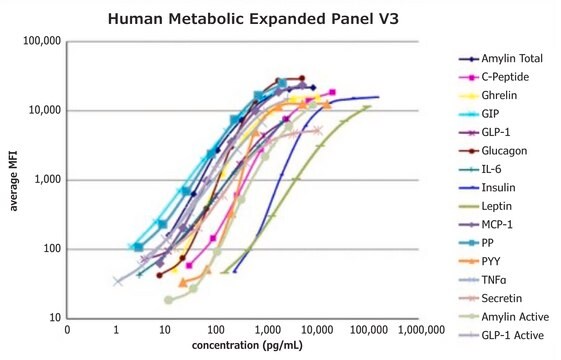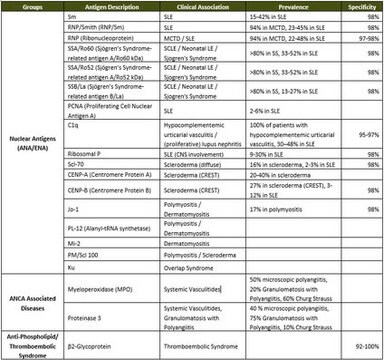HNS2MAG-95K
MILLIPLEX® Human Neuroscience Magnetic Bead Panel 2 - Neuroscience Multiplex Assay
The analytes available for this multiplex kit are: Angiogenin, ApoE4, FABP3, Ferritin, Neurogranin, and TREM2.
About This Item
Produits recommandés
Espèces réactives
human
Fabricant/nom de marque
Milliplex®
assay range
accuracy: 124%
(Neurogranin)
accuracy: 84%
(FABP3)
accuracy: 85%
(ApoE4)
accuracy: 94%
(TREM2)
accuracy: 97%
(Angiogenin)
sensitivity: 11.0 pg/mL
(MinDC + 2SD; TREM2)
sensitivity: 14.3 pg/mL
(MinDC + 2SD; FABP3)
sensitivity: 162.8 pg/mL
(MinDC + 2SD; ApoE4)
sensitivity: 19.9 pg/mL
(MinDC + 2SD; Neurogranin)
sensitivity: 5.8 pg/mL
(MinDC + 2SD; Angiogenin)
sensitivity: 6.1 pg/mL
(MinDC + 2SD; Ferritin)
standard curve range: 15-50,000 pg/mL
(TREM2)
standard curve range: 2-10,000 pg/mL
(Angiogenin)
standard curve range: 24-100,000 pg/mL
(FABP3)
standard curve range: 244-1,000,000 pg/mL
(ApoE4)
standard curve range: 5-20,000 pg/mL
(Neurogranin)
standard curve range: 6-25,000 pg/mL
(Ferritin)
inter-assay cv: <10%
intra-assay cv: <5%
(Angiogenin)
inter-assay cv: <10%
intra-assay cv: <5%
(FABP3)
inter-assay cv: <10%
intra-assay cv: <5%
(TREM2)
inter-assay cv: <15%
intra-assay cv: <10%
(Ferritin)
inter-assay cv: <15%
intra-assay cv: <10%
(Neurogranin)
inter-assay cv: <15%
intra-assay cv: <5%
(ApoE4)
Technique(s)
multiplexing: suitable
Méthode de détection
fluorometric (Luminex xMAP)
Description générale
MILLIPLEX® Human Neuroscience Bead Panel 2 is a 6-plex kit to be used for the simultaneous quantification of any or all of the following analytes in cerebrospinal fluid (CSF), serum/plasma and cell/tissue culture supernatants for homogenates: Angiogenin, ApoE4, FABP3, Ferritin, Neurogranin, TREM2.
Panel Type: Neuroscience
Spécificité
Cross-reactivity between the antibodies and any of the other analytes in this panel is non-detectable or negligible. There is <5% cross-reactivity from ApoE2 and ApoE3 recombinant proteins on the ApoE4 beads.
Application
- Analytes: Angiogenin, ApoE4, FABP3, Ferritin, Neurogranin, TREM2
- Recommended Sample type: Plasma, Serum, CSF, Cell/Tissue culture supernatant
- For Plasma/Serum a 1:10 dilution is recommended for the optimal detection of the analytes FABP3, Ferritin, Neurogranin and TREM2.
- For Plasma/Serum a 1:200 dilution for ApoE4 and Angiogenin is recommended.
- Because the sample dilutions differ for Plasma/Serum samples ApoE4 and Angiogenin cannot be plexed in the same assay as FABP3, Ferritin, Neurogranin and TREM2.
- CSF samples require a 1:10 dilution and so may all be plexed together
- Cell/Tissue culture supernatants or homogenates may be used neat or diluted in appropriate control medium.
- Bead diluent must be present in order to detect Angiogenin. (Biotinylated-Angiogenin detection antibody is included in the bead diluent.)
- Research Category: Neuroscience
Caractéristiques et avantages
Conditionnement
Stockage et stabilité
Informations légales
Clause de non-responsabilité
Mention d'avertissement
Danger
Mentions de danger
Classification des risques
Acute Tox. 3 Dermal - Acute Tox. 4 Inhalation - Acute Tox. 4 Oral - Aquatic Chronic 2 - Eye Irrit. 2 - Skin Sens. 1
Code de la classe de stockage
6.1C - Combustible acute toxic Cat.3 / toxic compounds or compounds which causing chronic effects
Certificats d'analyse (COA)
Recherchez un Certificats d'analyse (COA) en saisissant le numéro de lot du produit. Les numéros de lot figurent sur l'étiquette du produit après les mots "Lot" ou "Batch".
Déjà en possession de ce produit ?
Retrouvez la documentation relative aux produits que vous avez récemment achetés dans la Bibliothèque de documents.
Contenu apparenté
Neuroscience multiplex assays, such as MILLIPLEX® multiplex assays, enable simultaneous measurement of neuroscience-related biomarkers to gain a better picture of neurodegenerative diseases, neurological disorders, and neuropeptide/neurohormone signaling.
Notre équipe de scientifiques dispose d'une expérience dans tous les secteurs de la recherche, notamment en sciences de la vie, science des matériaux, synthèse chimique, chromatographie, analyse et dans de nombreux autres domaines..
Contacter notre Service technique